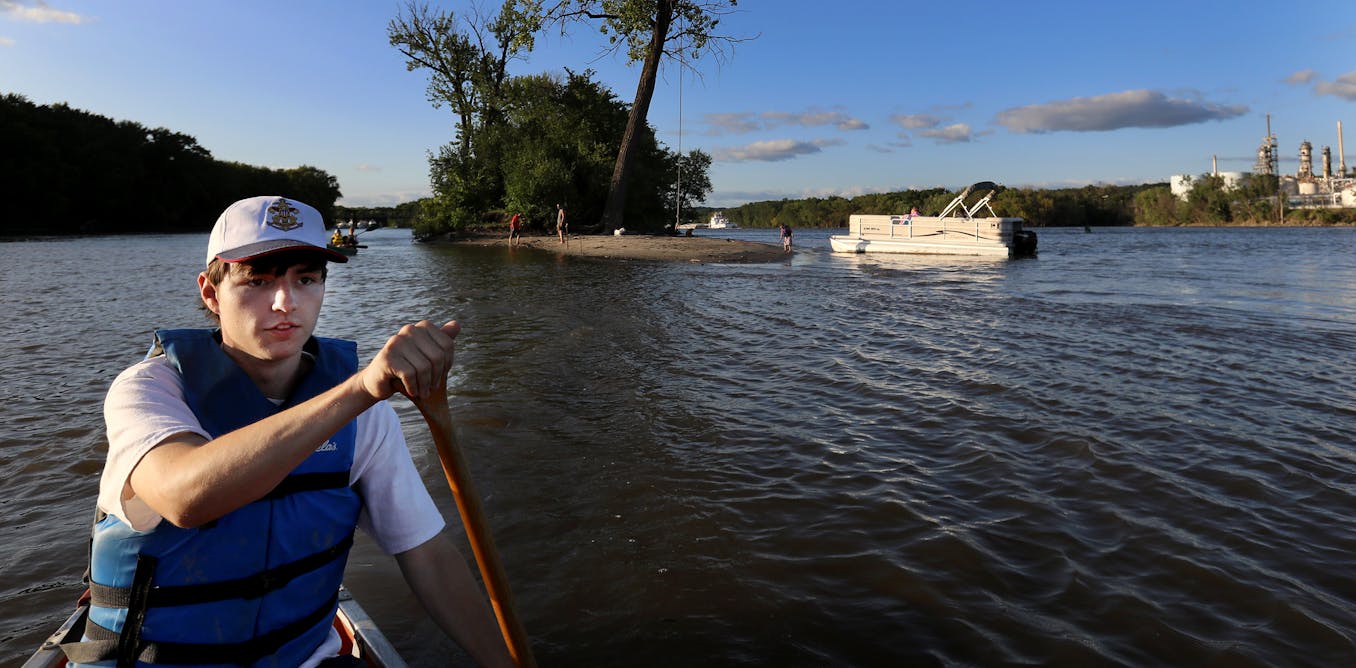The video titled “Major Failure at Sea” documents a harrowing day for the sailors as they navigate through unforeseen challenges. The sailors find themselves facing dying winds, no propulsion, sizzling batteries, and toxic fumes while navigating a sea full of debris. Despite the stressful situation, the sailors manage to survive the ordeal, thanks to their quick thinking and a stroke of luck.
The video provides a glimpse into the unpredictable nature of life at sea and highlights the importance of being prepared for any scenario. The sailors express their gratitude to the team at HH Catamarans for their swift support during the crisis.
Jason and Nikki Wynn, the couple behind the adventure, share their curiosity-driven mindset and their passion for off-grid living and alternative lifestyles. They emphasize the importance of embracing the unknown and connecting with strangers to truly experience the world around them.
Overall, “Major Failure at Sea” is a riveting account of a challenging day at sea, showcasing the resilience and determination of the sailors in the face of unexpected adversity.
Watch the video by Gone with the Wynns
Video “Major Failure At Sea” was uploaded on 10/27/2024. Watch all the latest Videos by Gone with the Wynns on Gretopia




































What is a FAD?
Great that HH made good on the batteries!
I feel so sorry for you guys with all the problems that you are having with your boat. And after going for warranty too. I hope you can finally have a SMOOTH sail.
Your positivity is beyond refreshing. You both have such great qualities that keep you grounded and positive in situations most people would hone in on the negatives. I love your channel and how peaceful your content is!🩵
Why not replace your battery straps with ratchet straps you enjoy?
I am not wishing for that, but the moment of lighting strike we are going to know if all that electronic is a good idea on a sailboat.
I have had melting batteries, don't turn of the engines , just disconnect the batteries, as in disconnect the cables, open the hatches, and carry on motoring.
I hope your problem is already solved. I have my own solar system at home and one thing I did was to put breakers just about 10 amps less than the battery rated amps in the positive pole of my LiFePO4 batteries. When something is wrong the breakers open and so they protect the batteries.
I have to say that AGM Batteries are not recommended if you are in the tropic. Down below Ill send you information about it’
HH Catamarans typically use high-capacity lithium-ion (LiFePO4) battery systems in their motor-assisted models. These lithium batteries are popular due to their longer lifespan, lighter weight, faster charging capability, and high energy density compared to traditional lead-acid batteries. HH Catamarans specifically focuses on eco-friendly and efficient energy systems, so they often combine these battery systems with solar panels, energy regeneration, and sometimes even hybrid power setups.
Are you interested in a specific model or setup configuration for these batteries?
AGM (Absorbent Glass Mat) batteries are generally less suited for tropical climates due to several factors that affect their performance and longevity in higher temperatures:
1. Reduced Lifespan in High Temperatures: AGM batteries are sensitive to heat. Tropical climates can lead to elevated battery temperatures, which can significantly shorten the lifespan of AGM batteries. Heat speeds up chemical reactions within the battery, leading to faster degradation of the lead plates, and thus reducing overall capacity and efficiency.
2. Accelerated Self-Discharge: In hot conditions, AGM batteries experience a faster self-discharge rate. This means they lose charge more quickly when idle, necessitating more frequent recharging. Over time, repeated cycles caused by high self-discharge can wear down the battery, making it less effective.
3. Risk of Overheating: Unlike lithium-ion batteries, which have active thermal management features in many setups, AGMs can overheat during charging in hot climates. This can lead to “thermal runaway,” where the battery’s temperature rises uncontrollably, potentially resulting in damage or a dangerous condition.
4. Limited Charging Flexibility: AGM batteries have specific charging requirements, and if the charging setup is exposed to high temperatures, it may become difficult to optimize charging conditions. Overcharging in hot weather can cause AGM batteries to lose water in the electrolyte, leading to further reduced capacity and life.
For these reasons, lithium-ion batteries, with better heat tolerance and lower self-discharge, are typically recommended in tropical and warm climates over AGM batteries.
Just as a thing: if you ever think your battery has any form of runaway event, disconnect it from the power system. There should always be some form of isolation switch you can use. Learn where it is and keep it clear off debris.
GREAT parking job and congratulations….Love you both .♥
Happy to seeo youguys are safe. Now just relax.
dang! The one positive of this type of crisis is you found the weak point in your overall system that without moving the buffer battery, took down diesel and electric engines, very important info for both you guys and HH, there needs to be some kind of reasonable backup for that failure, good thing that buffer battery was still good!
Wow, I can't believe it's been 8 years that you have been sailing. Where does the time go?
Just a question but if you lost all wind in this situation, you could tow yourself in by using the tender.
Epic ❤
This was a video I been waiting for 😊
Loved night sail
Loved watching the boat performance
How your both fantastic team
Safe travels
❤
The old saying is must been built on a Friday 😮
You need a prop with a guard. That prop looks pathetic.
battery fire can kill you quick. Junk batteries? Switch to all diesel before the boat burns down Ditch the lithium or those on a boat can kill you.
After the day you had that was perfect boat control and docking. just glad they did not leak and put acid over a great looking boat or the two of you.
I think that's a super cool boat, with all sorts of impressive engineering and technology. But, there is something to be said for simple, tried and true old-tech. Especially for when you're on a long reach, or sailing somewhere that probably isn't going to have anything you need to make repairs.
This channel used to be fun in the sun and now it's "fixing our boat in a cloudy place"
Can I recommend you keep a super capacitor jump starter on board to start the engines. I keep one on board and it’s only the size of a large brick and could jump start a bus!
At least your not out in the middle of the wide open Pacific. But what if ???
GREAT TEAM YOU 2❤
Phew! That was quite the drama. So glad you made it safely to port
You are familiar with the smell of hydrogen sulfide if you have ever smelled a rotten egg. Hydrogen sulfide is heavier than air, so if you smell that smell, better don't go down. Hydrogen on the other hand has no smell but is highly flammable. The way you describe the smell, it was probably plastics overheating.
Great video in the aspects of a married couple working together, & HH, to overcome an issue and get to a marina safe & sound & out of hurricane danger. Oh, and still talking to each other…
Holy cow, that episode scared the crap out of me. Can't imagine what you guys are going through. Thank God you guys made it to safe harbor. 😮
Good video guys, Super quality .
This is called being on the bleeding edge of cutting edge technology. Godspeed and an abundance of patience to you.
Your channel and content are truly amazing to watch. The more I watch recent episodes, the more it seems like the HH44 might be a lemon. Wish you two all the best ❤️
What's a FAD?
So sorry you are having so many issues with your new $$$$ cat.
30:41 at least it was in calm weather and seas
Yeah – you need vapor respirators, not only for the lead-acid batteries, but also for the lithium-iron phosphate batteries. Also, being a 30+ year electrical engineer with extensive experience with marine power systems – you certainly have a voltage regulator/charger that is spiking over the 13.8-14.1 VDC range and the batteries are being pushed beyond their max voltage and their ability to recombine the gasses internally – and are outgassing. I've seen this in RVs as well when the AC/DC 'charger'/power supply go over-voltage. A good thing to have immediately checked would have been to see what the battery terminal voltages were – my guess is that they were above 15VDC. AGM batteries can't take that for very long – which is why I really don't like using them. In my opinion AGM batteries should have internal audible alarms anytime their terminal voltage exceeds 14.5 VDC AND they should have pressure sensors to detect when they over pressure – ESPECIALLY when used on a boat. in such a case you could periodically disconnect the battery and still get several starts out of them even in not recharging.
Yay!! You made it safely!! Hope the battery thing is solved quickly! And the fridge too! Eek! Y’all are weathering the storms (literal and figurative) very well, tho!! Always inspiring!